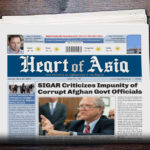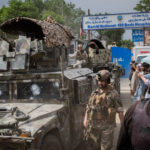John Sopko, the U.S. Special Inspector General for Afghanistan Reconstruction (SIGAR) has strongly criticized a move by the Afghan government to appoint one of the key masterminds behind the collapse of the old Kabul Bank to take charge of a government agency.
On June 1st, President Ashraf Ghani in a decree appointed Mahmoud Karzai as acting minister of urban development and land
“One of the masterminds behind the failure of the largest Afghan bank—Kabul Bank–is now currently under consideration to oversee a major Afghan government agency, if that is true, it seems that we are taking a step back and Afghanistan is step backwards, not step forward,” said John Sopko, Special Inspector General for Afghanistan Reconstruction (SIGAR).
The SIGAR chief called on the Afghan government to take action against important cases of corruption.
“…but some practical examples that we hope to see in the Afghan government’s efforts when we do this report (new SIGAR report on corruption) would include addressing the backlog of important corruption cases that the Afghan government is aware of, but has not done anything about it—and I would say just one example there has been on case sitting for over six years dealings with hundreds of millions of dollars lost of the US and Afghan government,” he said.
SIGAR also criticized the Afghan government for not taking practical action on 6,500 cases of corruption that have not been assessed.
“We hope we will see that the arrest, trial and imprisonment of powerful individuals engaging in corruption occurs on a regular basis,” Sopko said.
Seven months have passed since the former acting minister of housing Jawad Paikar was dismissed from his job over reports of misusing his official authority, but the presidential Palace so far has not said anything about the progress on his case.
SIGAR has frequently said that corruption poses serious threats to the efforts of the US and the international community for Afghanistan.
According to SIGAR, the Afghan government’s anti-graft policy has been only on paper.
“The lack of political will and the serious weakness that exists in terms of freedom of the legal and judicial institutions has blocked the way for the investigation of cases related to the ministers over the past ten years,” said Naser Taimoori, a researcher of Integrity Watch Afghanistan (IWA).
“Corruption has been institutionalized within the structure, it means that we cant summarize it within the working area of a minister or deputy minister, if we are supposed to investigate this issue, then we have to bring lots of these networks to justice,” said Mahdi Rasekh, a member of parliament.
The Attorney General of Afghanistan has so far not provided any details about the progress on corruption cases involving cabinet ministers.
The UN mission in Afghanistan has also raised concerns over corruption in Afghanistan.
Deborah Lyons, the Secretary-General’s Special Representative for Afghanistan, on Thursday briefed the UN Security Council on the situation in Afghanistan and described corruption as a major challenge for the country.
The UN envoy said that the impunity of well-connected political figures remains a major obstacle to fighting corruption in Afghanistan.
President Ashraf Ghani has repeatedly stated in the past that fighting corruption is among his top priorities.













